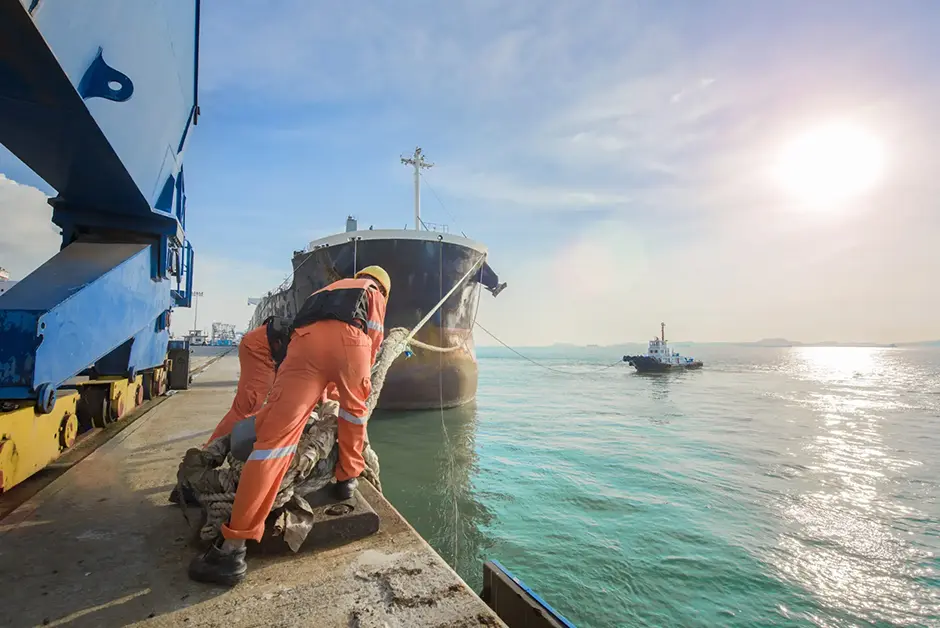As a maritime worker, you’re exposed to more occupational risks than the average U.S. worker. According to the National Institute for Occupational Safety and Health (NIOSH), workers in the maritime industry face a fatality rate that is 4.7 times higher than in other industries. In the maritime industry, some jobs are more dangerous and hazard-prone than others. Here we answer some frequently asked questions about maritime injury so you know what to do if you’ve been injured.
What Are the Most Dangerous Maritime Jobs?
Here are some of the most at-risk maritime workers:
Oil Rig Workers
Oil rig workers extract and drill oil and gas and operate and maintain the equipment used. They often work with dangerous chemicals and in extreme weather conditions. Oil rig workers are exposed to substantial risks, such as oil spills, fires, and explosions.
Fishermen
Fishermen harvest seafood from the open sea. Their job involves navigating rough waters, setting nets, and handling heavy gear. They often work long, strenuous hours, leading to fatigue, which increases the risk of accidents. Fishermen face various risks, such as stormy weather and the risk of their vessel capsizing.
Longshoremen
Longshoremen are responsible for loading and unloading cargo in ports, operating heavy machinery, and handling containers. The fast-paced port environment increases the likelihood of errors and accidents. They face the danger of being struck by moving cargo, accidents involving faulty machinery, and falls from elevated surfaces.
Underwater Welders
Underwater welders repair structures like pipelines underwater. They often work with limited visibility and must deal with rapid changes in weather conditions, electric shock, diving-related injuries, and exposure to extreme pressures.
Shipbuilders
Shipbuilders construct and repair vessels. The risks they face include falls, exposure to toxic shipbuilding materials, and the possibility of being struck by machinery. As a shipbuilder, you’ll often work in uncomfortable positions, in confined spaces, and with heavy machinery.
What Are the Most Common Types of Maritime Accidents?
Several types of accidents occur in the maritime industry. Here are the most common ones:
Slips and Falls
Slips and falls are one of the most common types of maritime accidents. Workers may encounter wet decks, uneven surfaces, or adverse weather conditions, leading to slips. A slip and fall can cause injuries ranging from contusions to fractures.
Mechanical Failures
Mechanical failures are a significant risk in the maritime industry. Equipment malfunctions, engine failures, or technical glitches can lead to accidents with severe consequences. For instance, if a crane used in moving heavy containers malfunctions, workers within the vicinity may suffer catastrophic injuries.
Failing Overboard
Falling overboard is a potentially life-threatening maritime accident. It can occur due to unstable conditions, inadequate safety measures, or human error. Once overboard, the worker may be in danger of drowning, especially if safety measures have been inadequate. Besides the immediate risk of drowning, survivors may suffer injuries from the fall itself.
Fires and Explosions
Fires and explosions are among the most catastrophic offshore accidents. And they often result from the presence of flammable substances offshore. The injuries caused by fires and explosions can range from burns and smoke inhalation to more severe trauma. In addition to the immediate physical harm, survivors may experience long-term psychological effects.
What Are the Most Common Injuries in Maritime Accidents?
Burn Injuries
You can suffer burns from accidents involving hot machinery, steam, or hazardous chemicals. Maritime workers who work in engine rooms or near industrial equipment are more vulnerable to burn injuries than others. The severity of burns can vary. But even minor cases can be painful and may require extensive medical attention. In more severe cases, burns can lead to disfigurement and long-term physical or psychological trauma.
Head Injuries
Accidents involving heavy equipment, turbulent seas, and confined spaces may cause head injuries. Maritime workers may suffer concussions or other traumatic brain injuries of varying severity from falling objects, collisions, or accidents during maintenance work.
Repetitive Motion Injuries
Repetitive motion injuries are common among maritime workers engaged in tasks that require repetitive actions. These actions include lifting heavy loads, operating machinery, or performing routine maintenance. These injuries usually develop over time. Some examples are carpal tunnel syndrome and tendonitis. The cumulative strain on muscles and joints can lead to chronic pain, decreased mobility, and a reduced ability to perform job responsibilities.
Drowning
Accidents such as ship collisions, oil rig explosions, platform collapses, and equipment failures can land maritime workers in the deep sea. The effect of drowning is usually determined by how long the person was underwater. Survivors may only suffer short-term effects. However, some cases may have long-term consequences and even death.
What Should I Do if I’ve Been Injured in a Maritime Accident?
If you were injured in a maritime accident as a worker, take these steps to protect your rights.
1. Seek Immediate Medical Treatment
After an offshore accident, your priority should be to receive medical care for your injuries. Whether the accident happened at sea or on the shore, you need to seek medical care as soon as possible. Getting immediate medical care will give you the best chance of recovering from your injuries. It will also help document the extent of your injuries and the cost of care, which will help prove your case.
2. Inform Your Employer
Many maritime laws require you to report your maritime injuries within a specific timeframe. The Jones Act requires injured seamen to report their injury within seven days. Other maritime workers have a 30-day window under the Longshore and Harbor Worker’s Compensation Act (LHWCA). Failing to meet these deadlines can make you lose your right to file a claim and receive compensation.
3. Document Evidence
Both the Jones Act and the LHWCA require you to prove that your employer’s fault caused the accident. So, you need to collect evidence. Take pictures or videos of the accident scene, gather witness statements, keep medical records, and get other relevant documents, such as incident reports or ship logs. The more evidence you have, the higher your chances of getting a successful outcome in your injury claim.
4. Contact an Experienced Maritime Attorney
Consult a maritime attorney before meeting with insurance companies, your employer, or any third party involved with your case. Maritime law is complex. A maritime lawyer can provide legal guidance on your rights and options. They can also negotiate with insurance companies on your behalf, investigate the case, and represent you in the entire claim process.
SOURCES:
Centers for Disease Control and Prevention: Center for Maritime Safety and Health Studies
U.S. Department of Labor: Longshore and Harbor Workers’ Compensation Act Frequently Asked Questions










